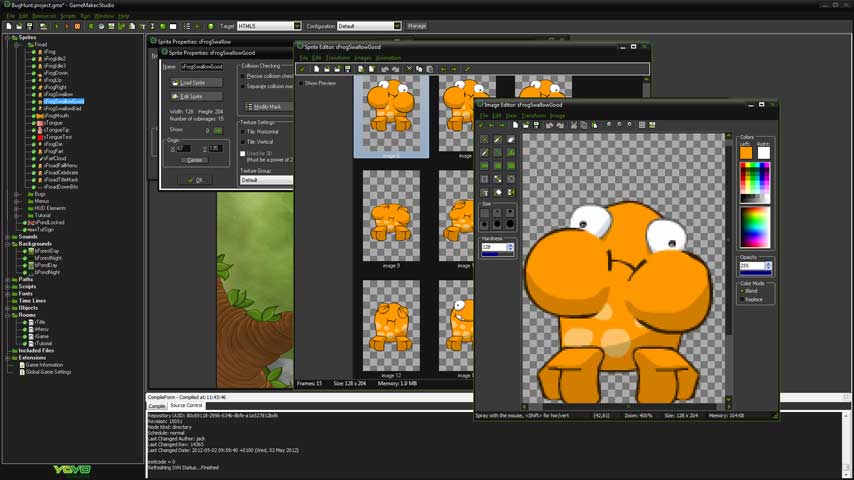There’s no tool in the world that can make you a good game designer – but here are a few to help you get started.
Making games is really not easy. I know you kick back on your couch and think about the kind of game you’d like to make – Bayonetta combat but with Dragon Age 2 conversations and it’s an MMORPG but also it’s set in your really cool and totally original universe where everyone has cat ears. Maybe you even fantasise about opening a studio, hiring some artists and programmers, and bringing this vision to life. Maybe you’ve signed up to a course of study to put you on this path.
The reality of games development is very likely much more complicated and difficult than you imagine – but it’s nowhere near impossible. If you’re humble enough to start from first principles, learning to make simple, derivative games until you grasp the theory; mastering some basic programming; and learning how graphics work so you can at least give direction to your artist; you can make great games, and maybe one day you’ll attract the eye of a company on the lookout for a talented all-rounder. Or maybe you’ll go into business for yourself and make the next great mobile hit.
The point is, there’s nothing standing between you and becoming a games developer besides time and motivation. You don’t even need to spend anything, if you’ve got a working PC. Check out these free tools for making games, all of which can be mastered by a determined beginner.
Note: This list is focused on software designed to help you build entire games, rather than specific tools for sound, modelling and so on. It is incomplete and presented in alphabetical order.
Adventure Game Studio
Thank to alphabetisation, the first cab off the rank is a genre-specific tool. Adventure Game Studio is exactly what you’d expect – a suite for making traditional 2D point-and-click adventure games.
This narrow restriction needn’t clip your wings, though, as there’s a lot more to life than taping a cat to a pole and using it to retrieve a compute mouse from a drainpipe in the name of wacky adventure. The adventure genre can be an incredibly effective storytelling medium, as the award-winning Gemini Rue shows. This, and a couple of other WadjetEye games, were put together in AGS.
AGS isn’t as intuitive as some of the other tools on this list, so make sure you have a cup of tea and a basic plan before you fire up its initially overwhelming interface.
Construct 2
If you really want to jump right into game making with the least amount of culture shock, Construct 2 is for you. It carefully uses plain English terminology rather than jargon, and is big on WYSIWYG drag-and-drop editing.
If you like Construct 2, the paid versions offer some more features, but if you’ve really hit the software’s limits but you still haven’t satisfied your ambitions, it’s probably best to move on to another tool. You’re obviously in it for the long haul, and it’s time you learned to talk like mummy and daddy, who are programmers.
GameMaker
Conveniently, the next stop for beginners after Construct 2 is usually GameMaker, which is similarly friendly to newbies but will rapidly teach you what the things you’ve been doing are called in the big wide world. When you’re ready to venture into programming, its scripting language is there to support you.
GameMaker should not be underestimated; some of your favourite games, like Spelunky, began life in YoYoGames’s free kit.
If you want to get on board, you can download the free version of GameMaker 8.1, which is no longer being updated as YoYoGames has moved on to the “sequel”, I guess – GameMaker Studio. A free version of GameMaker Studio is also available. I suggest you download and try both, as they offer differing restrictions. (And if you decide to buy a full version, keep an eye out for sales, including on Steam).
Image via OgreJungle.
Mod tools
I can’t underline firmly enough how useful modding tools are to those with an interest in telling stories or designing worlds, rather than learning programming or art or some other aspect of development. You don’t need to build an engine or balance game mechanics – you can just jump in and craft a new adventure and setting using the available assets.
Whether you want to recreate your original universe in full or just design a short quest line or challenge arena, modding tools will teach you a lot about how games are put together – and what makes them satisfying.
Check your game library to see if you own any games with free modding suites, or even “simple” level editors. The Elder Scrolls series is a big supporter of modding, and one guy who took advantage of this landed a job at Bungie. Players have done some amazing things in Trials: Fusions. If you’ve got the time and the patience, you can build worlds – or even full games.
Next: five more great free game making tools.




Comments
Post a Comment